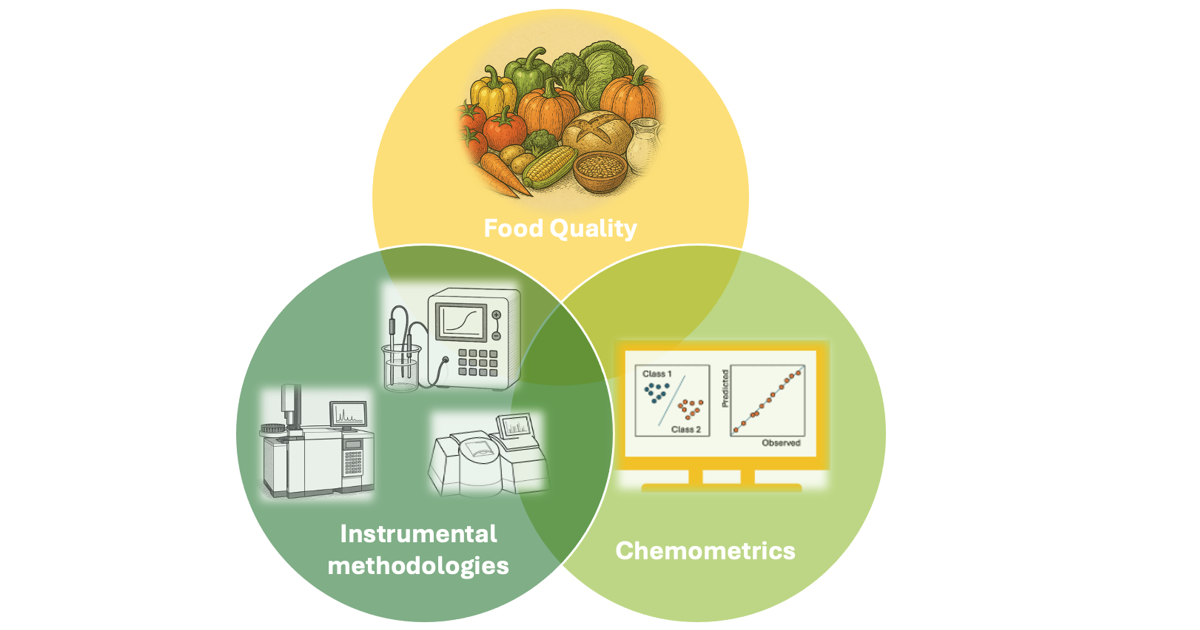Instrumental and Chemometric Methodologies to Assess Food Quality
A special issue of Foods (ISSN 2304-8158). This special issue belongs to the section "Food Engineering and Technology".
Deadline for manuscript submissions: 30 January 2026 | Viewed by 1390

Special Issue Editors
Interests: food; sensors; spectroscopy; quantification chemometrics
Interests: machine learning; artificial intelligence; chemometrics; multivariate calibration
Special Issue Information
Dear Colleagues,
Currently, the use of instrumental methodologies for the evaluation of food quality has gained growing relevance due to their precision, speed, and ability to provide objective data. Instrumental techniques, such as chromatographic techniques (GC, HPLC), spectroscopic techniques (NIR, Raman, fluorescence…), imaging techniques, or electrochemical sensors, are increasingly employed to obtain detailed chemical, physical, and structural information about food products. These instrumental approaches are suitable for both laboratory and on-site applications. However, they often generate complex datasets that require advanced chemometric tools for meaningful interpretation. The integration of instrumental techniques with data analysis enables comprehensive assessments, including authentication, food adulteration, shelf-life prediction, and safety evaluation. This Special Issue focuses on the development and application of instrumental methodologies—individually or in combination—for the assessment and control of food quality. Emphasis is placed on practical implementations and scientific advances that support a more accurate, efficient, and reliable food quality evaluation process, combining instrumental techniques and multi-way calibration and pattern recognition.
Dr. Olga Monago-Maraña
Dr. Fabricio Alejandro Chiappini
Dr. Daniel Martín-Vertedor
Guest Editors
Manuscript Submission Information
Manuscripts should be submitted online at www.mdpi.com by registering and logging in to this website. Once you are registered, click here to go to the submission form. Manuscripts can be submitted until the deadline. All submissions that pass pre-check are peer-reviewed. Accepted papers will be published continuously in the journal (as soon as accepted) and will be listed together on the special issue website. Research articles, review articles as well as short communications are invited. For planned papers, a title and short abstract (about 100 words) can be sent to the Editorial Office for announcement on this website.
Submitted manuscripts should not have been published previously, nor be under consideration for publication elsewhere (except conference proceedings papers). All manuscripts are thoroughly refereed through a single-blind peer-review process. A guide for authors and other relevant information for submission of manuscripts is available on the Instructions for Authors page. Foods is an international peer-reviewed open access semimonthly journal published by MDPI.
Please visit the Instructions for Authors page before submitting a manuscript. The Article Processing Charge (APC) for publication in this open access journal is 2900 CHF (Swiss Francs). Submitted papers should be well formatted and use good English. Authors may use MDPI's English editing service prior to publication or during author revisions.
Keywords
- chemometrics
- food analysis
- quality control
- food adulteration
- food authentication
- machine learning methods
- chromatographic techniques
- electrochemical sensors
- imaging techniques
- spectroscopic techniques
Benefits of Publishing in a Special Issue
- Ease of navigation: Grouping papers by topic helps scholars navigate broad scope journals more efficiently.
- Greater discoverability: Special Issues support the reach and impact of scientific research. Articles in Special Issues are more discoverable and cited more frequently.
- Expansion of research network: Special Issues facilitate connections among authors, fostering scientific collaborations.
- External promotion: Articles in Special Issues are often promoted through the journal's social media, increasing their visibility.
- Reprint: MDPI Books provides the opportunity to republish successful Special Issues in book format, both online and in print.
Further information on MDPI's Special Issue policies can be found here.








